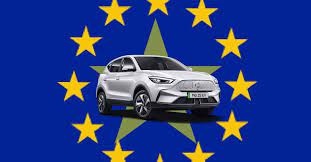
Investigators from the European Commission will inspect Chinese automakers in the coming weeks as part of an inquiry into whether to impose punitive tariffs to safeguard European electric vehicle (EV) manufacturers, according to a Reuters report quoting information from three people familiar with the matter.
The inspectors will visit BYD, Geely, and SAIC, according to two sources, with one claiming that the investigators will not visit non-Chinese brands produced in China, such as Tesla, Renault, and BMW.
The investigation, which began in October and is set to span 13 months, aims to examine if cheaper, Chinese-made EVs benefit unfairly from state subsidies. China has labelled the investigation as protectionist, raising tensions between Beijing and the EU.
There were no comments available from any of the contending parties – the European Commission, China's commerce ministry, BYD, and SAIC.
Geely also declined to comment, citing its October statement that the business followed all rules and supported fair market competition worldwide.
According to one source, the investigators have arrived in China, and another says visits are slated for this month and February.
According to one source, the visits are for verification work, which includes on-site inspections to examine the automakers' questionnaire responses. According to European Commission records, the probe is currently in the "initiation stage," with verification inspections scheduled for April 11.
The sources requested anonymity since the visit's details were confidential.
Last Monday, China launched an anti-dumping investigation into brandy imported from the European Union, appearing to target France, which supports the EV probe. Popular Chinese vehicles exported to Europe include SAIC's MG and Geely's Volvo.
Chinese-made vehicles now account for 8% of the European Union's EV market and are expected to grow to 15% by 2025, with these EVs often selling for 20% less than EU-made ones.
In October, China's Great Wall Motor said that it was the first automaker to respond to the EU subsidy inquiry.
China-EU relations have been strained due to issues such as Beijing's increasing connections with Moscow following Russia's invasion of Ukraine.
The EU aims to lessen its reliance on the world's second-largest economy, particularly for resources and products required for its green transition.
At the same time, Chinese EV companies, ranging from market leader BYD to smaller rivals Xpeng and Nio, are increasing their efforts to go overseas as domestic competition heats up and domestic growth slows. Many have prioritised sales to Europe.
China is expected to have surpassed Japan as the world's top auto exporter last year, exporting 5.26 million vehicles worth almost $102 billion, according to a Chinese auto group.
(Source:www.reuters.com)
The inspectors will visit BYD, Geely, and SAIC, according to two sources, with one claiming that the investigators will not visit non-Chinese brands produced in China, such as Tesla, Renault, and BMW.
The investigation, which began in October and is set to span 13 months, aims to examine if cheaper, Chinese-made EVs benefit unfairly from state subsidies. China has labelled the investigation as protectionist, raising tensions between Beijing and the EU.
There were no comments available from any of the contending parties – the European Commission, China's commerce ministry, BYD, and SAIC.
Geely also declined to comment, citing its October statement that the business followed all rules and supported fair market competition worldwide.
According to one source, the investigators have arrived in China, and another says visits are slated for this month and February.
According to one source, the visits are for verification work, which includes on-site inspections to examine the automakers' questionnaire responses. According to European Commission records, the probe is currently in the "initiation stage," with verification inspections scheduled for April 11.
The sources requested anonymity since the visit's details were confidential.
Last Monday, China launched an anti-dumping investigation into brandy imported from the European Union, appearing to target France, which supports the EV probe. Popular Chinese vehicles exported to Europe include SAIC's MG and Geely's Volvo.
Chinese-made vehicles now account for 8% of the European Union's EV market and are expected to grow to 15% by 2025, with these EVs often selling for 20% less than EU-made ones.
In October, China's Great Wall Motor said that it was the first automaker to respond to the EU subsidy inquiry.
China-EU relations have been strained due to issues such as Beijing's increasing connections with Moscow following Russia's invasion of Ukraine.
The EU aims to lessen its reliance on the world's second-largest economy, particularly for resources and products required for its green transition.
At the same time, Chinese EV companies, ranging from market leader BYD to smaller rivals Xpeng and Nio, are increasing their efforts to go overseas as domestic competition heats up and domestic growth slows. Many have prioritised sales to Europe.
China is expected to have surpassed Japan as the world's top auto exporter last year, exporting 5.26 million vehicles worth almost $102 billion, according to a Chinese auto group.
(Source:www.reuters.com)














